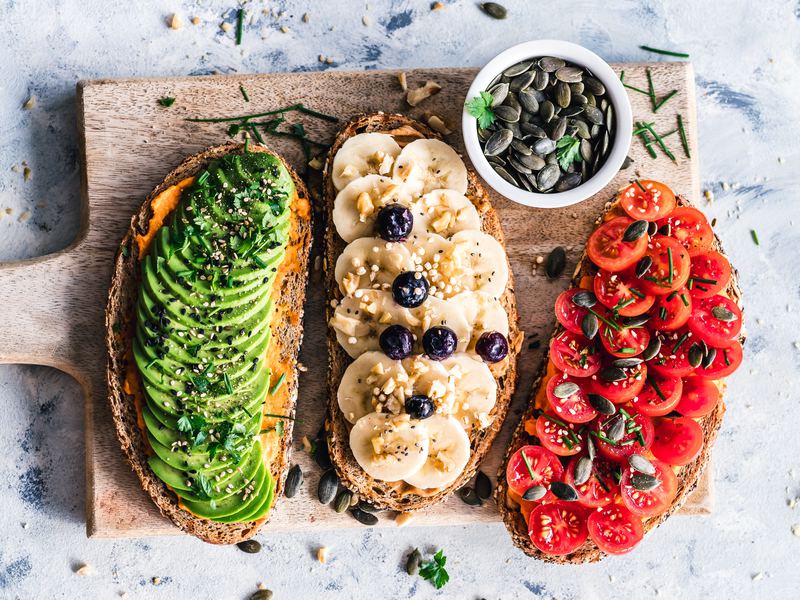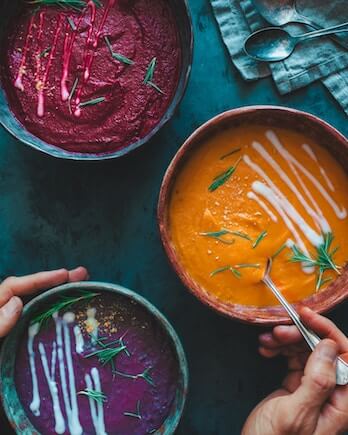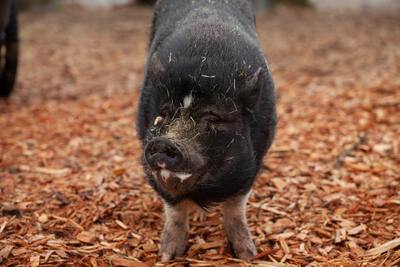
Vegan Diet & Veganism

Veganism is a diet and lifestyle choice that avoids the consumption of all animal products. A vegan does not eat any animals or animal products (including all meat and fish, dairy, eggs, honey, gelatin, etc) nor use any product made with any animal materials (including leather, wool, cashmere, silk, fur, down, etc). Further, a vegan does not participate in or support activities that exploit animals such as circuses, animals at theme parks, zoos, animal races, petting zoos, hunting, fishing (including trap-and-release), or the breeding and selling of animals as pets (rescues, however, are fine). Veganism embodies a dedicated effort to live a cruelty-free lifestyle to better our health, the earth, and all sentient beings that inhabit it.
The word "vegan" (pronounced 'VEE-gan') originated from a British man named Donald Watson who had wanted an appropriate name to describe what a "100% vegetarian" has always eaten, as distinguished from other types of mixed plant & animal product dietary choices.
He called his newsletter "The Vegan News" and described veganism as "the practice of living on fruits, nuts, vegetables, grains, and other wholesome non-animal products."
Excerpt from the first issue of 'The Vegan News' November 1947:
Without making any claims to self-righteousness, we feel in a strong position to criticise lacto-vegetarianism, because the worst we can say will be but a repetition of criticism we have already levelled against ourselves. Therefore we shall express the Truth as we see it and feel it, and though our friends the lacto-vegetarians may reject our ideas if they wish, we hope they will not reject us for stating them. Watson was born on September 2, 1910 and lived to be 95 years old. He died on November 16, 2005.
Vegan Nutrition
The key to a nutritionally sound vegan diet is variety. A healthy and varied vegan diet includes fruits, vegetables,
plenty of leafy greens, whole grain products, nuts, seeds, and legumes. Work on limiting, or avoiding processed foods,
which are hard to digest and are without the energy of live whole foods (whole foods are those that you eat the way they grow).
Some nutritionists also recommend healthy unrefined oil supplements (like hemp, flax, coconut,etc...) and other vitamins.
Check out our beginners guide to nutrition by a licensed dietatry nurse, or an
advanced nutrition guide here.
1. Why Go Vegan?
Because there is plenty to eat without eating flesh meat or taking an animal's milk. Because there is plenty to use without killing animals for their body parts. Choosing vegan is conscientiously choosing compassion over killing, ecological preservation over destruction, health over disease, and simplicity over complexity. As everything in this universe are inter-connected, each decision we make affect not only ourselves, but that of our neighbors, the planet, and all the creatures that share our earth home.
Moreover, nutritionists, physicians, and people everywhere recognize that plant products are good sources of protein, iron, calcium, and vitamin D, because they can be easily absorbed by the body and don't contain artery-clogging fat. The American Dietetic Association states, "Well-planned vegan diets are appropriate for all stages of the life cycle, including during pregnancy, lactation, infancy, childhood, and adolescence."
2. What is the purpose of veganism?
Everyone has their own reason for adopting a vegan diet. For some, they feel that it best aligns with their ethics to not harm or inadvertently cause suffering to another sentient being. Vegans do not contribute to the slaughter and regular abuse of animals confined within the animal agriculture industry. This includes animals used for meat as well as the dairy and egg industries which also cause significant suffering and early death to animals. Beyond ethics, some choose to go vegan for health reasons. These individuals include professional athletes who wish to perform at their optimal best by adhering to the naturally anti-inflammatory vegan diet, as well as those who wish to either prevent or reverse disease. Common health problems such as diabetes, obesity, skin issues, gastrointestinal distress, cardiovascular disease, and even cancer can be largely avoided or corrected by following a whole foods, plant-based diet. A vegan diet is also the single largest change an individual can make to combat climate change, according to a 2018 comprehensive global analysis on the environmental impact of our food system (1). Animal agriculture places a significant demand on our earth’s natural resources. The combined global industries make up one quarter of the global water footprint (2); 41 percent of all US land is devoted to animal agriculture (3); and if cattle and dairy cows were a country, they would contribute more greenhouse gas emissions than the entire European Union (4). From an environmental perspective, the purpose of veganism is to curtail the impending climate crisis expedited by the animal agriculture industry. Finally, veganism is a social justice issue. A plant-based diet is free from the feminist implications of forcibly impregnating cows to produce milk; it is free from the exploitive powers of the meat and dairy lobbies that wield fiancial power over policy makers to push their products on consumers; and it is free from the discrimination subliminaly present within animal-based food industries which markets dairy products to largely lactose intolerant communities of color (2).
3. Is it healthy to go vegan?
Yes! A whole foods based vegan diet is arguably the healthiest choice one can make in regards to diet. The lifestyle is rich in nutrients and antioxidants and generally absent of inflammation and disease-causing foods such as meat and dairy. For more information on the health benefits of a vegan diet, visit the Physicians Committee for Responsible Medicine, NutritionStudies.org, and Switch4Good.
4. Do vegans have vitamin deficiencies?
Not if one eats a variety of plant-based foods and takes a B12 supplement. It is entirely possible and relatively simple to obtain all the nutrients one needs on a vegan diet, because plants are the most nutrient-dense of all. In fact, one may improve their vitamin consumption by going vegan, as 95 percent of Americans are fiber deficient, while a plant-based diet provides ample amounts of this necessary nutrient (5). As with any diet, it is important to keep track of certain nutrients and know where to find them. For example, calcium, vitamin D, iron, and B12 are vitamins to keep in mind. Vegans can obtain calcium from dark leafy greens, tahini, almonds, and beans. Vitamin D actually does not come from food- we get it from the sun. Thirty minutes of direct sun exposure a day should do the trick. Various plant milks and cereals are also fortified with vitamin D. A supplement is also another safe option, according to plant-based critical care physician, Dr. Milton Mills (6). Plant-based foods high in iron include beets, spinach, chickpeas, tofu, edamame, and tempeh, just to name a few. As for vitamin B12, it is recommended to take a daily supplement. While this nutrient can be found in nutritional yeast, one would have to consume nutritional yeast every day to obtain their daily quota. Vitamin B12 supplements are inexpensive and found in most supermarkets.
5. What do vegans eat?
An incredibly delicious variety of food! Many who go vegan claim that the diet change actually expands their palate and introduces them to new foods. Anything that doesn't come from an animal is fair game. This includes statiating whole foods such as fruits, vegetables, legumes, grains, and nuts; as well as tantalizing prepared foods such as baked goods, burgers, pizza, burritos, sushi, smoothies, ice cream, sandwiches, soups, and of course, epic salads. In today's world, there is a high-quality vegan equivalent for every animal product. Just a quick scan of the HappyCow recipes will demonstrate the wide variety of vegan options representing virtually every cuisine one could crave.
6. Do vegans eat eggs?
No, vegans do not eat anything that comes from an animal. In addition to red and white meat, this includes fish, all dairy, honey, gelatin, and eggs. The egg industry causes suffering for millions of hens, and male baby chicks are killed in masses since they aren't of use to farmers. Additionally, hens have eggs due to their natural reproductive cycle, they belong to the hens, and aren't created for the purpose of human consumption. Aside from the fact that eggs aren't vegan, eggs aren't healthy.
7. Can you lose weight as a vegan?
The short answer is yes, one can lose weight in a healthy way on a vegan diet. The long answer: Before the emergence of the plant-based analogues we enjoy today, most people who transitioned to a vegan diet tended to lose weight without trying, as they were forced to avoid animal-containing processed foods and eat more whole foods. That is the key. A whole foods plant-based diet is nutrient-rich and generally calorically poor—meaning that plant foods provide optimum nutrients without an over abundance of calories. However, transition foods—such as vegan ice cream, burgers, baked goods, and cheeses—are not whole food sources and do contain a significant amount of calories, processed sugars, and fats. As with any diet, the key to weight loss is to adhere to mostly whole food sources and avoid eating an overabundance of calories.
8. Do vegans get cancer?
Everyone is susceptible to cancer, but eating a plant-based diet can significantly reduce one’s risk. Processed meats have officially been classified as a Group 1 carcinogen by the World Health Organization. These animal products have been linked to various cancers such as prostate, pancreatic, and colorectal (7). The consumption of dairy products has also been associated with higher rates of hormone-dependent cancers such as breast and prostate cancers (8,9). As many doctors have cautioned—from the primetime celebrity docs such as Dr. Memet Oz to the hardworking plant-based researchers including Dr. Neal Barnard and Dr. Milton Mills—genes load the gun but lifestyle pulls the trigger. Even if one is genetically predisposed to cancer, one may be able to curtail the onset by avoiding animal foods associated with this disease.
Tanya Flink is a writer, editor, and content manager. Her passion for and knowledge of the vegan lifestyle extends to a wide range of issues from nutrition to public policy. Her work can be found in numerous vegan publications and non-profit organizations including VegNews, Switch4Good, Livekindly, HappyCow, VegOut LA & NYC, and Organic Authority, among others. She is also a former personal trainer and bootcamp instructor.
References
1. Poore, J., and T. Nemecek. “Reducing Food's Environmental Impacts through Producers and Consumers.” Science360, no. 6392 (2018): 987–92. https://doi.org/10.1126/science.aaq0216.
2. Flink, Tanya, Jasmin Singer, and Molly Arenson. “Why Ditch Dairy.” Switch4Good, 2019. https://switch4good.org/why-ditch-dairy/.
3. 41%: Merrill, Dave, and Lauren Leatherby. “41% Of US Land Is Used for Livestock Production According to This Report.” Bloomberg, July 31, 2018. https://www.arespectfullife.com/2018/08/05/41-of-u-s-land-is-used-for-livestock-production/.
4. McMahon, Jeff. “Meat And Agriculture Are Worse For The Climate Than Power Generation, Steven Chu Says.” Forbes, April 4, 2019. https://www.forbes.com/sites/jeffmcmahon/2019/04/04/meat-and-agriculture-are-worse-for-the-climate-than-dirty-energy-steven-chu-says/#67244b8311f9.
5. Quagliani, Diane, and Patricia Felt-Gunderson. “Closing America's Fiber Intake Gap: Communication Strategies From a Food and Fiber Summit.” National Center for Biotechnology Information, U.S. National Library of Medicine, 7 July 2016, https://www.ncbi.nlm.nih.gov/pmc/articles/PMC6124841/.
6. Switch4Good. Switch4Good, April 26, 2019. https://switch4good.org/here-comes-the-sun-and-vitamin-d/.
7. World Health Organization (2015). [online] Available at: https://www.iarc.fr/wp-content/uploads/2018/07/pr240_E.pdf [Accessed 15 Sep. 2019].
8. Ganmaa, Davaasambuu, and Akio Sato. “The Possible Role of Female Sex Hormones in Milk from Pregnant Cows in the Development of Breast, Ovarian and Corpus Uteri Cancers.” National Center for Biotechnology Information, U.S. National Library of Medicine, 24 Aug. 2005, https://www.ncbi.nlm.nih.gov/pubmed/16125328.
9. Torfadottir, Johanna E, et al. “Milk Intake in Early Life and Risk of Advanced Prostate Cancer.” National Center for Biotechnology Information, US National Library of Medicine, 15 Jan. 2012, https://www.ncbi.nlm.nih.gov/pmc/articles/PMC3249408/.
More Articles:
Disclaimer: The views expressed in articles published on HappyCow are those of the authors alone. They do not represent the views or opinions of HappyCow nor its staff.
Some links in this article are possibly part of Amazon's affiliate program, so when you make a purchase a small amount will go to support the HappyCow website.
This information is not intended to replace the diagnosis, treatment and services of a physician. Any recommendations and indications are at the user's discretion. For severe or life-threatening conditions, always seek immediate medical attention. While we work to ensure that product information is correct, and list only products containing vegetarian ingredients, on occasion manufacturers may alter their ingredient lists. Actual product packaging and materials may contain more and/or different information than that shown on our Web site. We recommend that you do not solely rely on the information presented and that you always read labels, warnings, and directions before using or consuming a product. For additional information about a product, please contact the manufacturer. HappyCow assumes no liability for inaccuracies or misstatements about products.




